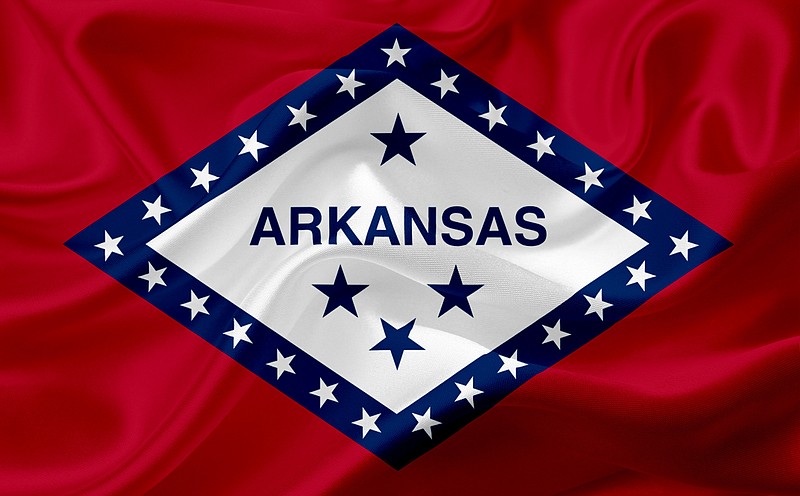LITTLE ROCK - The race for a seat on the Arkansas Supreme Court is technically nonpartisan, but the close ties of one of the two main candidates to the state Republican Party - she's married to its leader - highlight just how partisan such campaigns have become, with outside conservative groups outspending the candidates themselves.
Barbara Webb, chief administrative law judge for the Arkansas Workers Compensation Commission and the wife of the state Republican Party chairman, is running against Pulaski County Circuit Judge Morgan "Chip" Welch in the March 3 election.
Although both candidates have been promising to be independent voices if elected to the court, Welch has been making noise about Webb's appeals to Republicans and speeches to GOP gatherings around the state. She's had public support from top Republican leaders, including Sen. Tom Cotton and former White House Press Secretary Sarah Sanders, and one of Webb's campaign mailings features a photo of GOP Gov. Asa Hutchinson.
"It hadn't escaped my notice that party politics is the family business," Welch said recently. "It is some concern to me. I noticed that she's pretty much talking to an echo chamber of one political party."
Webb and Welch are running for the seat being vacated by retiring Justice Jo Hart, and whoever wins will be elected to an eight year term. The court has angered conservatives in recent years with rulings blocking part of the state's plan to execute eight inmates in quick succession in 2017 and disqualifying a GOP-backed 2018 ballot measure that sought to cap the amount of damages that could be awarded in lawsuits.
Webb, who is also a former prosecutor and circuit judge, said she will speak to any group that invites her to talk about her campaign. Webb has donated to the state and national Republican parties, and was a delegate to the Republican National Convention in 2016. She said her husband's term as state GOP chairman ends at the end of this year.
"My record will prove that I'm not going to bring partisan politics to the bench," said Webb, who noted that she served as a judge for the Workers' Compensation Commission under Democratic and Republican governors and was appointed to the state's Ethics Commission by a Democratic attorney general. She said the only one who has inserted partisan politics into the race is Welch, with his criticism.
Welch isn't without his own political ties. He once ran unsuccessfully for the Legislature as a Democrat and he donated to Democratic candidates before he was elected judge. His daughter is also running as a Democrat for a seat in the Legislature, though Welch says his son is a Republican.
Court races in recent years have been overshadowed by increasingly bitter and expensive efforts by conservative groups to reshape the judiciary, both in Arkansas and nationwide. The Brennan Center for Justice said more than $39.7 million went into races for 48 judgeships in 21 states in the 2017-2018 elections, with nearly $11 million of that coming from special interest groups.
Arkansas is one of several states with prominent court races this year that could attract big spending by outside groups, In all, more than 80 Supreme Court seats are going before voters this year.
"These groups, in the states where they decide to focus, are essentially taking over and dictating the terms of the dialogue," Douglas Keith, counsel for the center's Democracy Program, said.
Outside money accounted for 84 percent of what was spent on high court races in 2018 in Arkansas, where two groups spent more than $2.8 million unsuccessfully trying to oust Justice Courtney Hudson. Hudson, who went by Courtney Goodson before her divorce last year, won re-election in 2018. During the race, she took the unusual step of filing lawsuits to block the groups' ads and mailers.
One of the groups that targeted Hudson, the Republican State Leadership Committee's Judicial Fairness Initiative, filed paperwork with the state to spend money as an independent expenditure group and recently posted a 15-second video online promoting Webb's candidacy. The group spent $4.1 million on court races in Arkansas and two other states in the 2017-2018 cycle, the most among outside groups, according to the Brennan Center.
Welch has begun buying airtime for TV ads, according to filings with the Federal Communications Commission.
The candidates themselves have raised and spent modest amounts for a statewide race. Webb's campaign has raised more than $163,000 and spent more than $83,000 on the bid, while Welch's has raised more than $138,000 and spent about $117,000.
According to her most recent campaign finance report, two local Republican groups spent nearly $2,000 on a billboard promoting Webb's candidacy.
Following the lead of past court races, Webb and Welch avoid talking about political issues or matters that may come before the high court and instead focus on their experience or broader issues. Webb has said she'd like to see the state's courts expand the use of technology, and Welch he'd like to "de-mystify"the judiciary and make it more accessible to the general public.

